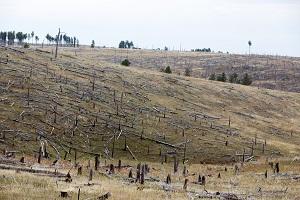
The heads of national statistical offices of 59 countries and 24 international organizations are gathering this week in Geneva and around the globe for the 69th plenary session of the Conference of European Statisticians, the decision-making body for statistical matters in the UNECE region and beyond.
Among the many big issues they are tackling is the role of official statistics in climate action.
The 2015 Paris Agreement called for urgent action on climate change. National governments have set themselves ambitious targets that can be met only with profound changes in how our economies operate. As the Paris Agreement stresses, these commitments must be based on and monitored by reliable, trusted and broadly accessible data. National Statistical Offices (NSOs) can play a key role as providers and stewards of such data, but only if they step up willingly to proactively take on this role. They need to communicate to policymakers the potential of what they can offer. And in turn, they need to listen carefully to the needs of policymakers, scientists and climate advocates who require data for their work.
The heads of NSOs recognize that there is an increasing urgency to these needs. Yet climate change-related statistics do not yet command the same kind of attention or support in national statistical systems as the core domains of economic and social statistics. In some countries they still occupy a ‘niche’ role in the NSO.
As the CES delegates discussed, part of the solution will be making official climate statistics more reliable, more accessible and more timely, so that the official statistics produced by NSOs are the first thing users will turn to when they need information.
Statistics Netherlands, for instance, has begun to produce quarterly estimates of greenhouse gas emissions in accordance with the guidelines of the Intergovernmental Panel on Climate Change (IPCC), thanks to a new methodology that permits rapid insights into actual emissions trends. This is in stark contrast to the lag of nine months after the end of the reference year usually seen for greenhouse gas emissions data. These more rapid estimates make it much easier for researchers and government to track the links between economic change and environmental impacts.
Climate change is not a new topic for CES. The Conference has led international work on statistics related to climate change since 2011, resulting in its 2014 Recommendations on Climate Change-Related Statistics; the agreement in 2020 on a Set of Core Climate Change-related Indicators and Statistics; and in the publication in 2020 of the CES Recommendations on the Role of Official Statistics in Measuring Hazardous Events and Disasters. What is new in this week’s deliberations is the recognition that NSOs must shift gear from a technical focus to a high-level strategic perspective, as the cross-cutting nature of climate-change statistics becomes ever clearer and the policy demands become both more urgent and more complex. The centrality of statistics to such endeavours as measuring links between economy and climate change, monitoring progress towards a circular economy, and tracking the growth of green finance and green investment means that NSOs have work to do to strengthen the links across the economic, social and environmental domains.
CES brings together the heads of the national statistical offices of UNECE member States, OECD member countries and beyond, including from as far afield as Argentina, Brazil, Ecuador and Mongolia. These chief national statisticians, along with statisticians from international organizations including OECD, Eurostat, the International Monetary Fund, World Bank, CIS-Stat, EFTA, the European Central Bank, and a variety of UN agencies, form the governing body for statistical work in the UNECE region.
CES cooperation guides international statistical work in the region, helping countries to align their priorities, identify new and shared challenges, and work together to address them. Its work focuses on methodological guidance, modernization of statistics and capacity development, with dozens of groups of national and international experts contributing to a wide range of work in social and demographic, economic and environmental statistics and in the modernization of statistical systems.
At this year’s CES plenary session new guidelines and recommendations produced by CES expert groups are being presented to the Conference for endorsement on topics as diverse as assessing the quality of administrative data for censuses, waste statistics, measuring social exclusion, producing consumer price indices under lockdown, and statistics for assessing progress towards the SDGs.

